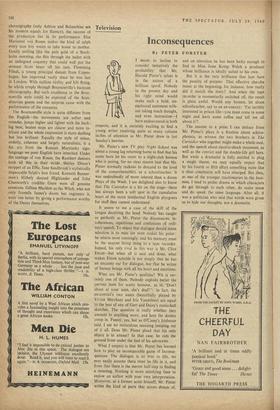Television
Inconsequences
By PETER FORSTER
Mr. Pinter's new TV play Night School was about a young lag returning home to find that his aunts have let his room to a night-club hostess who is posing, for no clear reason (not that Mr. Pinter normally reckons to descend to the level of the comprehensible), as a schoolteacher. It was undoubtedly of more interest than a dozen Plays of the Week. I am delighted also to know that The Caretaker is a hit on the stage—there has always been a soft spot in the cumulative heart of the more intellectual English playgoers for stuff they cannot understand.
It seems to me a case of the skill of the tongue deceiving the head. Nobody has caught so perfectly as Mr. Pinter the dissonances, in- coherences, repetitions and confusions of ordi- nary speech. To object that dialogue should mean selection is to miss (or even make) his point: he selects most cunningly, and his memory must be the nearest living thing to a tape recorder. Indeed, his only rival in this way is Mr. Clive Exton—but when all is said and done, what makes Exton notable Is not simply that he has an uncanny ear for dialogue, but that he writes of human beings with all his heart and emotions.
What are Mr. Pinter's qualities? Wit is cer- tainly one of them. Nobody exploits better the current taste for scatty humour, as in, 'Don't shout at your aunt, she's deaf!': in fact, the ex-convict's two aunts (beautifully played by Vivien Merchant and Iris Vandeleur) are equal to the best of any of Gert and Daisy's music-hall sketches. The question is really whether they amount to anything more, and here the doubts creep in. Funny, yes, but as O'Casey's Irishman said, I see no miraculous meaning jumping out of it all. Does Mr. Pinter plead that his only object is to amuse? In that case, he cuts the ground from under the feet of his advocates.
What I suspect is that Mr. Pinter has learned how to play an incomparable game of Inconse- quences. The dialogue is so true to life, we may easily assume there must be life in it, and from that there is the merest half-step to finding a meaning. Nothing is more satisfying than to endow an author with your own interpretation. Moreover, as a former actor himself, Mr. Pinter writes the kind of parts that actors dream of, and on television he has been lucky enough to find in Miss Joan Kemp Welch a producer whose brilliance is ideally suited to his own.
But it is the very brilliance that lays bare the paucity of purposz That effective cha-cha music at the beginning, for instance, how really did it match the story? And when the tape recorder is momentarily switched off, the result is plain awful. Would any hostess, let alone schoolteacher, say to an ex-convict: 'I'm terribly interested in prison life—you must come in some night and have some coffee and tell me all about it'?
The nearest to a point I can deduce from Mr. Pinter's plays is a fixation about schizo- phrenia, as witness the two brothers in The Caretaker who together might make a whole soul, and the speech about electric-shock treatment, as well as the convict and the double-life girl here. But while a dramatist is fully entitled to plug a single theme, we may equally expect that by his fourth or fifth effort something more like a clear conclusion will have emerged. But then, as one of the younger reactionaries in the busi- ness, I tend to prefer drama in which characters do get through to each other, do make sense and do speak the same language. After all, it was a politician who said that words were given us to hide our thoughts, not a dramatist.


































 Previous page
Previous page